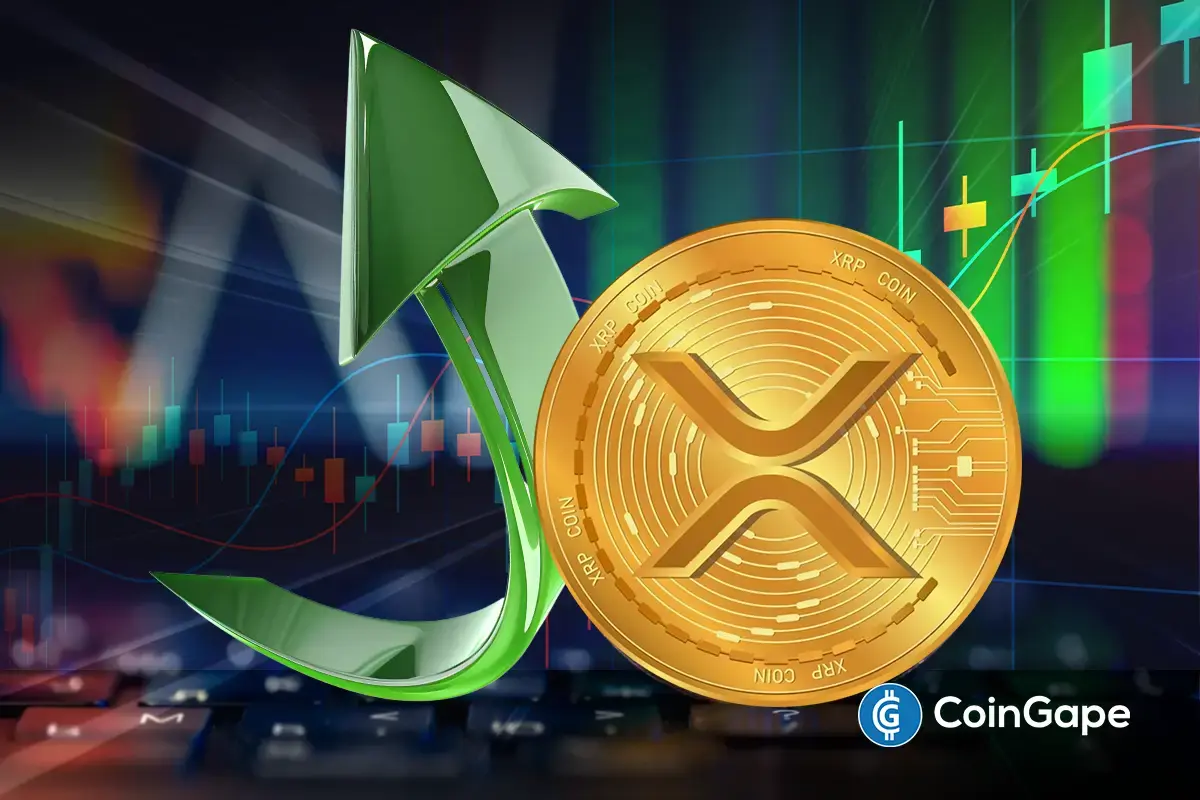Regulation
Former Treasury Official Criticizes FIT 21 Ahead of House Vote

The Financial Innovation and Technology for the 21st Century Act (FIT 21) that seeks to legislate the digital assets industry has been criticized by Graham Steele, a former Treasury official as the House of Representatives readies for a vote.
The bill, described as a light-touch regulatory framework for cryptocurrencies, does not address Big Tech, contrary to some claims.
FIT 21 Criticized Ahead of House Vote
The FIT 21 Act has generated a lot of discussion among members of the US House of Representatives and other stakeholders as the House prepares for a crucial vote. Graham Steele, a former Treasury official who is said to be eyeing the FDIC Chair position, criticized the bill’s approach to regulating digital assets.
Steele suggests that the legislation may not effectively address the issues of today’s financial technologies. However, some supporters of the bill have not only misrepresented it as an anti-Big Tech bill but also failed to include any specific provisions within the bill to directly regulate these corporations.
This petition about the FIT 21 Act uses progressive framing, claiming that the bill fights against “Big Tech.”
FIT 21 actually creates a light-touch regulatory framework for crypto, largely outside securities laws. (It contains no prohibition on Big Tech.)
Pretty sneaky. pic.twitter.com/jXJLmTr065
— graham steele (@steelewheelz) May 21, 2024
Many digital asset organizations such as Coinbase and Kraken have endorsed the bill as a means of providing a clear legal environment. It aims at establishing what should be considered as digital assets and increasing the powers of the Commodity Futures Trading Commission (CFTC) to cover these assets.
However, some of the senior Democrats such as House Financial Services Committee Ranking Member Maxine Waters and House Agriculture Committee Ranking Member David Scott have opposed the idea. They pointed to the fact that the bill threatens established case laws and may bring a certain level of instability in the traditional securities market.
Concerns Over Investor Protections and Overreach
The criticisms of FIT 21 are not only legal but also concern investor protection and the stability of financial markets. An internal email from the office of the Democrat Whip, leaked to Politico, stressed concern that the safe harbor provisions might allow companies to escape requirement of standard securities law, which might result in fraud and manipulation of the market.
This aspect of the legislation has led the lawmakers to arrange for a briefing with the Securities and Exchange Commission (SEC) to further deliberate on the consequences.
Further, the legislation has been criticized for the possibility of preventing shareholders from taking legal action against publicly traded organizations and for anticipating state legislation regarding digital assets. Such measures could dilute fiduciary standards and erode the fundamentals of capital markets, as per the information provided by the Democrat Whip’s office.
Market Reactions and Political Dynamics
The discussion of FIT21 raises a more extensive political conversation about cryptocurrencies and digital assets in the United States economy. For instance, the CEO of Galaxy Investment Partners, Mike Novogratz, has pointed out that the Democrats’ stance on the bill might be a huge mistake.
.@Novogratz says he’s sensing a move toward crypto acceptance from Democrats.
“I’ve been trying to talk sense. I was like, ‘Guys, this could be the biggest own-goal of the last six years,’” he says. “There is no reason to make crypto, which is a technology, a political issue.” pic.twitter.com/IszhoTs2v9— Squawk Box (@SquawkCNBC) May 21, 2024
He says that regulating cryptocurrencies should not be a partisan political agenda and should not be politicized. These statements are similar to an increasing trend in the industry to push for the adoption of crypto technologies regardless of the political party involved.
Read Also: Dogecoin Price Analysis: Can DOGE Break $0.2 Resistance Before May Ends?
The presented content may include the personal opinion of the author and is subject to market condition. Do your market research before investing in cryptocurrencies. The author or the publication does not hold any responsibility for your personal financial loss.
Regulation
Kraken Obtains Restricted Dealer Registration in Canada

Cryptocurrency exchange Kraken has obtained a Restricted Dealer registration in Canada. The registration comes after completing a pre-registration undertaking (PRU) process with Canadian authorities.
The exchange has also announced the appointment of Cynthia Del Pozo as its new General Manager for North America. Del Pozo will oversee Kraken’s growth initiatives in Canada.
Kraken Completes PRU Process In Canada
Kraken’s Restricted Dealer registration marks the completion of a thorough pre-registration undertaking (PRU) process with Canadian regulators. The registration places Kraken under the supervision of the Ontario Securities Commission (OSC). This oversight ensures users have access to secure crypto products within a properly regulated local ecosystem.
According to the Canadian Securities Administrators (CSA), the Restricted Dealer registration is one of eight firm registration types in Canada. This particular classification is used for firms that “do not quite fit under any other category.” It also comes with specific requirements and conditions set by securities regulators.
Kraken’s regulatory achievement comes during a period of change in the Canadian crypto sector. Just months earlier, competitor Gemini exchange announced its departure from the Canadian exchange market by the end of 2024. This was a move that surprised many and raised questions about cryptocurrency regulation clarity in the country.
Kraken Introduces New Canadian GM
Del Pozo has joined Kraken to lead its Canadian operations as the new General Manager for North America. She has nearly 15 years of experience in corporate development, operations, and fintech consulting. Del Pozo will help to guide Kraken’s expansion across Canada during this important phase of crypto’s development in the region.
“Canada is at a turning point for crypto adoption, with a growing number of investors and institutions recognizing digital assets as a vital part of the financial future. I’m thrilled to join Kraken’s mission at this critical moment, and to lead our expansion efforts, ensuring we continue to serve our clients long-term with innovative and compliant products,” said Del Pozo.
In her role, Del Pozo will focus on strengthening Kraken’s regulatory relationships and also scaling the company’s presence throughout North America.
Del Pozo also commented on the registration achievement: “This Restricted Dealer registration is testament to the high bar Kraken has always set for consumer protection, client service, and robust security. We’re excited to continue expanding our world-class investment platform and to deliver innovative products that provide real-world utility to Canadians.”
The Exchange’s Continued Growth In Canada
Over the past two years, the cryptocurrency exchange has shown steady expansion in Canada while working through the PRU process with regulators. During this period, the exchange has doubled its team size and monthly active users.
According to the official blog post figures, the firm now has more than $2 billion CAD in total client assets under custody. Kraken has also increased support for some of the most popular cryptocurrencies. It provides several CAD spot trading pairs that enable Canadians to trade crypto without paying expensive foreign exchange fees.
According to Innovative Research Group’s 2024 Investor Survey, 30% of Canadian investors currently own or have owned cryptocurrencies. Likewise, a KPMG Canada survey discovered that 30% of Canadian institutional investors now have exposure to cryptocurrencies, which means widespread adoption across investor types.
Disclaimer: The presented content may include the personal opinion of the author and is subject to market condition. Do your market research before investing in cryptocurrencies. The author or the publication does not hold any responsibility for your personal financial loss.
Regulation
USDC Issuer Circle Set To File IPO In April, Here’s All

USDC issuer Circle is reportedly set to file its initial public offering (IPO) in April as part of the firm’s plans to finally go public. The stablecoin issuer is allegedly already working with top financial institutions to achieve this move.
Circle To File IPO In Late April
According to a Fortune report, Circle is looking to file its IPO in late April, although the listing period remains uncertain. The report noted that when a company files to go public, its shares usually begin trading four weeks later, indicating that the listing could occur in May. However, there is also a scenario where the IPO process could drag on for months.
The stablecoin issuer is reportedly working with investment banks JPMorgan Chase and Citi to achieve its long-anticipated IPO. The firm had previously tried to go public in 2021 under a SPAC arrangement with a shell company.
The US SEC failed to sign off on this arrangement back then, and the company eventually scrapped these IPO plans by the end of 2022 when the crypto exchange FTX collapsed and the broader crypto market experienced a downturn.
Revelation about Circle’s IPO plans comes just days after the stablecoin issuer partnered with NYSE’s parent company to explore USDC’s use in traditional finance (TradFi). Meanwhile, the USDC stablecoin recently launched in Japan following approval from the country’s regulator. Notably, USDC is the first and only global dollar stablecoin approved under Japan’s stablecoin framework.
An Easier Path Now For The Stablecoin Issuer
Circle will likely face less resistance for its IPO plans under the current SEC administration. Under acting Chair Mark Uyeda, the Commission has shown its willingness to work hand in hand with crypto firms, which was missing under Gary Gensler’s administration.
US SEC Chair nominee Paul Atkins has also shown his willingness to change the approach that Gensler’s administration adopted towards crypto firms. During his nomination hearing, the SEC Chair nominee promised to prioritize providing regulatory clarity for the industry.
Circle’s IPO listing would be the biggest since the top crypto exchange Coinbase went public in 2021. Interestingly, Coinbase owns an equity stake in the crypto firm.
The firm’s USDC is currently the second-largest stablecoin by market cap, only behind Tether’s USDT. The stablecoin industry is heating up as more financial institutions look to develop their own stablecoin.
Donald Trump’s World Liberty Financial recently revealed plans to launch its USD1 stablecoin, while asset manager Fidelity is also considering doing so.
Disclaimer: The presented content may include the personal opinion of the author and is subject to market condition. Do your market research before investing in cryptocurrencies. The author or the publication does not hold any responsibility for your personal financial loss.
Regulation
Japan Set To Classify Cryptocurrencies As Financial Products, Here’s All

Cryptocurrency investors in Japan are bracing for impact following a plan to reclassify digital assets as financial products. While the plan has elicited excitement from cryptocurrency enthusiasts in the Far East, the ambitious plan will have to scale several legislative hurdles.
Japan Targets Reclassification Of Cryptocurrencies As Financial Products
According to a report by Nikkei, Japan’s Financial Services Agency (FSA) is inching toward classifying cryptocurrencies as financial products. Per the report, the FSA intends to achieve the reclassification via an amendment to the Financial Instruments and Exchange Act.
Currently, digital assets in Japan are considered crypto assets conferred with property rights and seen as payment means. Under the FSA’s plans, cryptocurrencies in Japan will be treated as financial products in the same manner as traditional financial products.
The FSA says it will adopt a slow and steady approach toward the reclassification, carrying out “a private expert study group” to test the waters. If everything goes according to plan, the FSA will submit the amended bill to Parliament in early 2026.
The classification of cryptocurrencies as financial products will have far-reaching consequences for the local ecosystem. Experts say treating cryptocurrencies as financial products will bring Japan closer to a crypto ETF launch amid a changing regulatory landscape.
Furthermore, the move may lower current cryptocurrency taxation for local investors since existing capital market rules will apply to the asset class.
A Fresh Bill For Crypto Insider Trading Is Underway
Apart from the reclassification, the FSA disclosed plans for new legislation against insider trading. The move flows treating cryptocurrencies as financial products and will strengthen existing investor protection rules.
“It is a direction to establish a new insider trading regulation that prohibits trading based on unpublished internal information,” said the FSA. “We will develop laws to prevent unfair transactions.”
However, Japan’s cryptocurrency scene is heating up to a boil, driven by local and international players. Last week, stablecoin issuer Circle secured approval from the FSA for USDC with top exchanges set to list the stablecoin.
Japan’s Metaplanet has tapped Eric Trump to join its Strategic Board of Advisors as it continues to load up Bitcoin.
Disclaimer: The presented content may include the personal opinion of the author and is subject to market condition. Do your market research before investing in cryptocurrencies. The author or the publication does not hold any responsibility for your personal financial loss.
-

 Market24 hours ago
Market24 hours agoSolana Faces Resistance While ETH Sees DEX Volume Boost
-

 Bitcoin22 hours ago
Bitcoin22 hours agoBitcoin Could Serve as Inflation Hedge or Tech Stock, Say Experts
-

 Market22 hours ago
Market22 hours agoSUI Price Stalls After Major $147 Million Token Unlock
-

 Market21 hours ago
Market21 hours agoBeInCrypto US Morning Briefing: Standard Chartered and Bitcoin
-

 Market20 hours ago
Market20 hours agoAnalyst Reveals ‘Worst Case Scenario’ With Head And Shoulders Formation
-

 Market18 hours ago
Market18 hours agoBitcoin Price Bounces Back—Can It Finally Break Resistance?
-

 Altcoin18 hours ago
Altcoin18 hours agoTether Expands Bitcoin Reserves with 8,888 BTC Buy—What’s the Plan?
-

 Market17 hours ago
Market17 hours agoEthereum Price Approaches Resistance—Will It Smash Through?
























✓ Share: